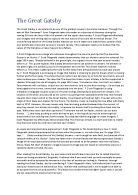Jenny Keroack 10-6-10
Kober Pd. 8
Revised Commentary
F. Scott Fitzgerald illustrates what he saw as a dichotomy between the decadent rich and deprived poor in this description of the valley of ashes. The theme of polarity is evident in this passage. Fitzgerald’s juxtaposition of the wealthy and the needy demonstrates the apathy of the former and the ignorance of the latter.
Fitzgerald uses simile to give the ashes life. He describes them as “growing like wheat.” (l. 3-4) Wheat is the cornerstone of civilization, a food product that humans have depended upon for centuries. By comparing the ashes to wheat, Fitzgerald emphasizes the ashes’ importance. Literally, the ash is present due to industrial waste. Corporations dump their toxic by-products in the valley of ashes, secure in their assumption that its poor residents cannot, or do not know how to, stop it.






